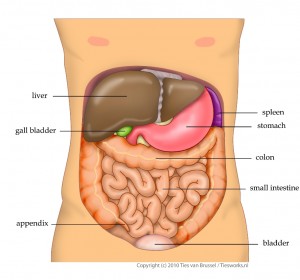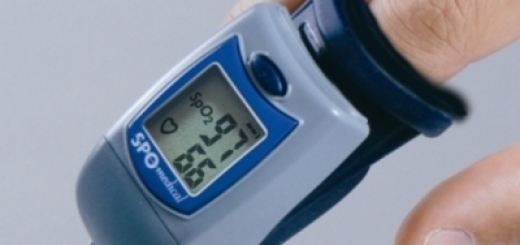The top 5 abdominal emergencies
Abdominal emergencies usually present with abdominal pain in association with other signs and symptoms. Even in hospitals with a wide range of diagnostic facilities it can be difficult to rapidly assess and diagnose an abdominal emergency, therefore it is often hard for a first aider to assess abdominal pain. 
First aiders should concentrate on assessing the severity of the patient’s condition and managing it appropriately, particularly, identifying time critical patients and commencing treatment immediately.
While the causes of abdominal pain are almost endless, the role of first aiders is to recognise and manage the more serious conditions appropriately.
Here’s our list of the top five abdominal emergencies to be aware of:
Internal bleeding
Possible indications can include haematemesis (vomiting of blood resembling ground coffee grounds), malena or profuse blood stained vomiting. A common cause of internal bleeding is a stomach (peptic) ulcer.
Diverticulitis
Faecal material seeps through thin walled diverticula in the large intestine and causes inflammation and possible abscesses. The patient may be systemically unwell (eg with a fever).
Abdominal Aortic Aneurysm (AAA)
This occurs when an area of artery wall becomes weak and starts dilating. When an AAA leaks or ruptures, it classically produces a sudden onset of severe constant pain that often radiates to the lower back. Palpation of the abdomen may reveal a ‘pulsatile mass.’ The skin over the abdomen may appear mottled and the legs may look paler than the rest of the body. An AAA will commonly present as a sudden collapse with sweating and abdominal pain.
Kidney stones
A patient suffering from one or more kidney stones will usually be in extreme distress. The symptoms usually start to occur when the ‘stone’ starts moving down the ureter and stretches the uretal wall. The pain is usually located in the patient’s side radiating into the groin and if often associated with nausea and vomiting
Ectopic pregnancy
An ectopic pregnancy occurs when a fertilised ovum becomes implanted outside the womb (usually in one of the Fallopian Tubes). Any acute abdominal pain in a woman of child bearing age especially when accompanied with tenderness, guarding and signs of shock, should be assumed to be an ectopic pregnancy until proven otherwise.
Want to learn more about first aid? Why not sign up to one of our free online first aid courses!





